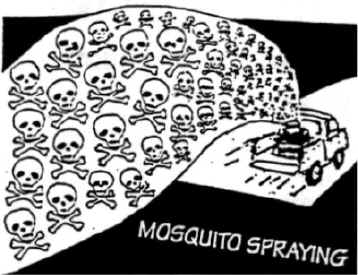 |
No Spray News James Irwin |
 |
No Spray News James Irwin |
April 15, 2002 Page 5
Cornell Researcher Also Questions Spraying
What percentage of the mosquito population in a sprayed area is killed by the pesticide? This question seems the most important, but we face a lack of knowledge, regarding the answer. If the efficacy of spraying approaches zero, what's the point of exposing our bodies, ecosystems, and wildlife to toxic chemicals in the first place? "We need to address this, because if we're just spraying all over and not doing a damn bit of good, then this is a waste of time and money, and it's also a hazard," says Dr. David Pimentel, a professor of entomology at Cornell University and a longtime pesticide researcher.3l
Most spraying efficacy studies are done under outdoor "lab" type conditions, often with caged mosquitoes placed at measured distances from spraying, at differing pesticide potencies. The tests do not take into account the many variables that are involved in ground spraying. As mosquitoes are mobile, and hide under leaves and in vegetation, extrapolating the efficacy numbers from these studies to actual spraying programs is questionable.
The CDC agrees that, "ground applications are prone to skips and patchy coverage in areas where road coverage is not adequate or in which the habitat contains significant barriers to spray dispersal and penetration."12 In a 1998 study, it took 2-3 times more insecticide to kill 90% of the mosquitoes in residential settings versus open areas. Such a high saturation is not permitted under current labeling safety guidelines.37
http://www.meepi-org/wnv/overkilima.htm
Mosquito Spraying Even More Problematical Here
Keep in mind that these scientists and researchers are questioning mosquito spraying in the northeastern U.S., where mosquitoes are most active in the evening when spraying is done. Here in the Columbia area, spraying is even more problematical, since it is done in the middle of the night, even though our predominant mosquito (the tiger mosquito) is active during the day.
Atlanta Area County Says "NO" to Routine Spraying
Mosquito Control at the DeKalb County Board of Health
Q: What is the DeKalb County Board of Health policy on mosquito spraying?
A: In the past, we have found that blanketed mosquito spraying to control adult mosquitoes is a costly and ineffective method of mosquito control. The most effective forms of mosquito control focus on eliminating mosquitoes before they become biting adults. In the event that the West Nile virus is found in metro Atlanta, public health officials may consider targeted mosquito adulticide spraying as part of a comprehensive mosquito control strategy.